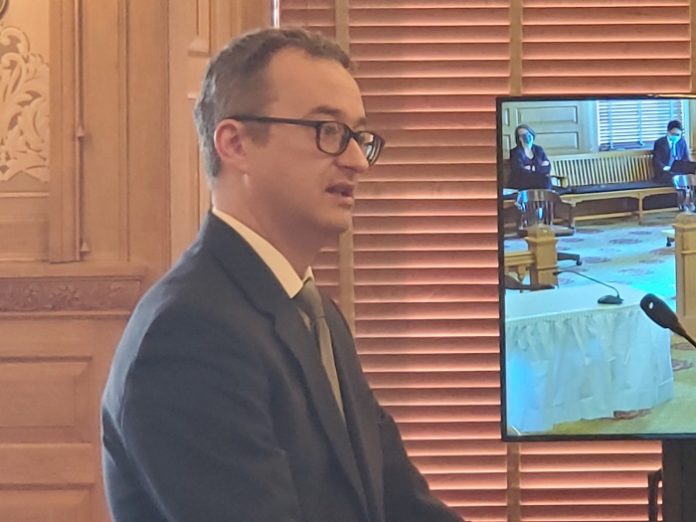(Updated with more reporting and edits throughout)
The Senate Judiciary Committee on Thursday sent Carl Folsom’s nomination for the Kansas Court of Appeals to the full Senate without recommendation.
Folsom, a federal public defender, is making a second run at the appellate court after the Senate rejected his nomination last year.
Last year, the Judiciary Committee made the same recommendation before voting the nomination down in the full chamber.
The Senate is expected to take up his nomination later today.
“Here I am, bouncing back like any public defender would, like every Kansan would, I am asking you to give me a fresh look,” Folsom told the Judiciary Committee.
Folsom tried to address some of the criticism that derailed his last nomination, which fell three votes short of the 21 required to win confirmation to the Court of Appeals.
“I’m not going to be an advocate for one side or the other,” Folsom told the committee.
“I’m going to be an advocate for the law. I’ll apply as it was written by the Legislature, and I am going to apply it as it’s written in the constitution.
“I will consider each case based on the law that’s written and apply it to the facts of the case without passion or prejudice,” he said.
Gov. Laura Kelly renominated Folsom last August to fill the seat that came open with the departure of Judge Steve Leben, who left to teach law at the University of Missouri-Kansas City.
It is believed that Folsom has an uphill fight after his nomination was rejected last year.
He could have somewhere between 16 and 18 votes currently, and the fate of the nomination could rest on whether he has changed the minds of any of the senators who voted against him last year.
Folsom came under the same line of scrutiny as he did last year when some senators questioned whether his legal career was too narrowly focused on defense work.
Republican Sen. Molly Baumgardner of Louisburg renewed her concern about whether Folsom had the breadth of experience to serve on the court.
“How has your C.V. or your resume and your application changed during that time period?” she said.
“Is the only difference that you have additional letters and newspaper articles…or is there something specific with regard to your resume and application that is different?”
Folsom said he had more time to prepare for this year’s hearing.
“Largely, I’m the same attorney I was eight months ago, seven months ago,” he said.
He said now there’s more time to give the committee some insight from the people who know him and are familiar with his legal career.
Baumgardner pressed Folsom on whether he thought he got a fair hearing last year when his confirmation was considered during the short special session.
“It was a fair hearing under the circumstances,” he said.
“Because of the really uniqueness of the special session and the statutory requirement of when the appointment had to be made, it was a rushed process,” he said.
“I think it has been more thorough this time,” he said.
“There’s more time for conferees and folks to submit their recommendations, there’s more time for me to meet with individual senators.”
Former Senate Vice President Jeff King, an Independence lawyer, came to Folsom’s defense on Thursday.
King said the Senate didn’t have enough time to fully vet Folsom last year.
“I know that eight months ago you had the opportunity to consider Carl with very little information,” King said.
“This process works. Your predecessors have shown that this process works well, but the process only works well when this committee has full information,” he said.
“Quite frankly, you did not have that about Mr. Folsom last time and you voted the best you could with what you had.”
Folsom has worked as an assistant federal public defender in Topeka since 2014.
Before that he served as an assistant federal public defender in Oklahoma after working in private practice for about three years.
He also worked in the Kansas appellate defender office, handling criminal appeals for indigent defendants.
He earned a bachelor’s degree in political science from the University of Kansas, graduating with honors and highest distinction. He received a law degree from KU in 2005.













